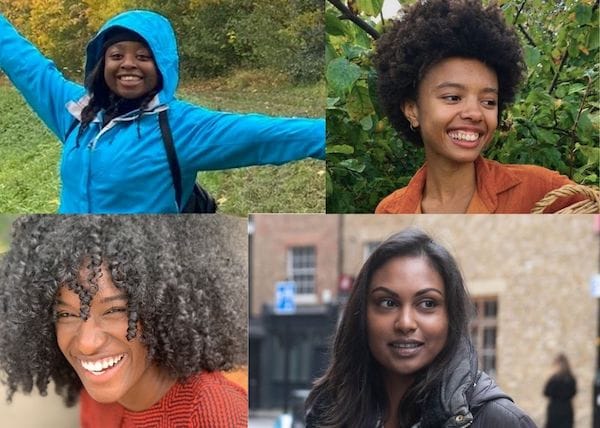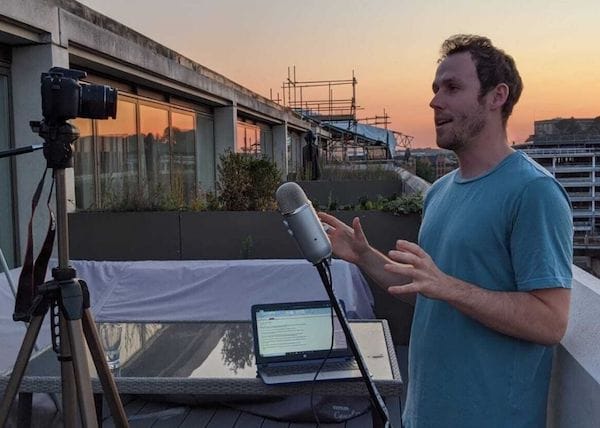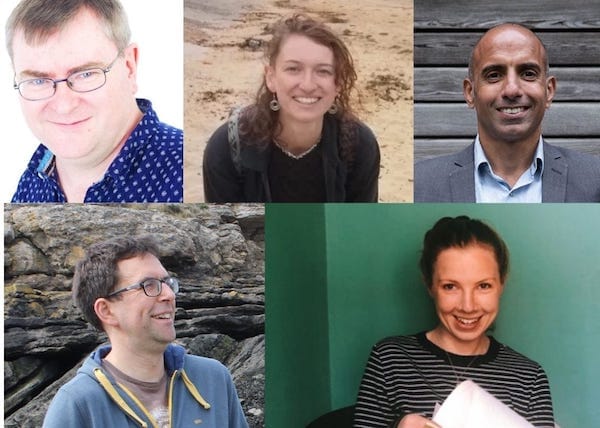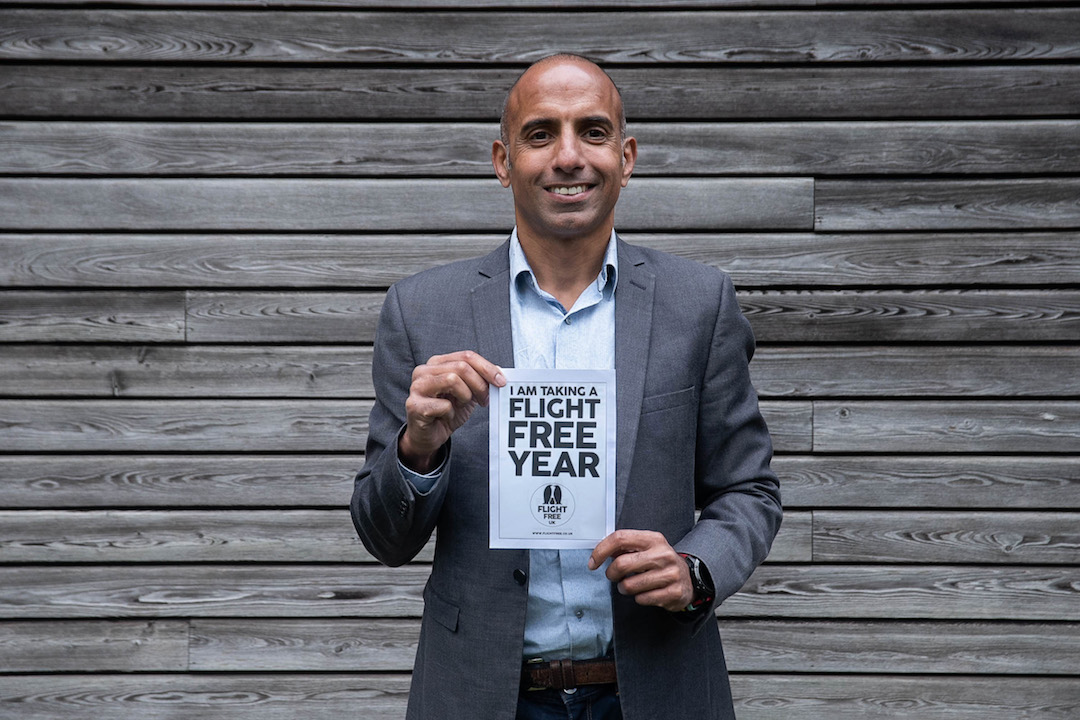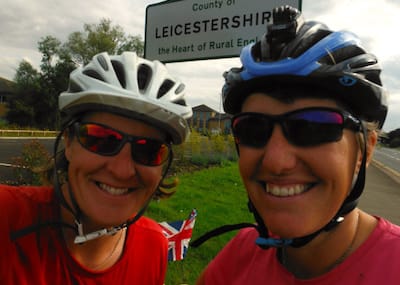This podcast is episode 12 of our #FlightFree2020 series. You can listen to the podcast, and access the rest of the series, at our podcast page.
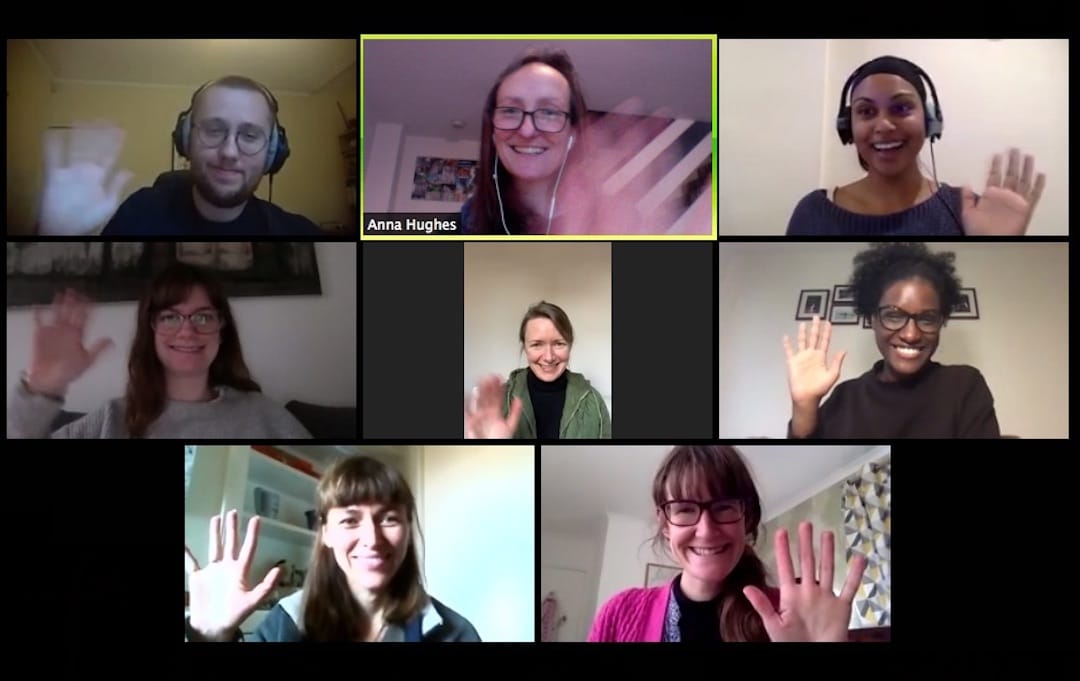
Anna:
This is the final podcast of our 2020 series, and we’re going to take this chance to reflect on the very strange year we’ve had, and hopefully look forward to a brighter in 2021.
We started the flight free campaign back at the beginning of 2019. The idea was that we would spend the year asking people if they would pledge to be flight free the following year, i.e. in 2020. Loads of people were inspired by the campaign, and we were thrilled to have coverage in national newspapers, on TV, on the radio, and by the end of the year, 2019, we had amassed over 5000 pledges for our flight free 2020. Not bad for a startup that hadn't existed 12 months before!
We were excited that it wasn’t just existing ‘green' types that were signing the pledge, it was businessmen, journalists, scientists, and travellers of all kinds who were concerned about climate change but hadn’t taken the plunge of reducing their flights until the campaign came along. We even signed up the deputy head of travel at the Independent, which was a big deal – if you travel for a living, it’s quite something when you say you’re not going to fly for a whole year.
So, then 2020 came along. We were looking forward to spending the year featuring the people who had made the pledge: sharing stories of their travels both in the UK and abroad, and celebrating this community of people we’d created who were taking action on the climate crisis.
Then, Covid hit. Everything stopped. Some people who were in the middle of their overland adventures had to break their pledge in order to fly home on an emergency repatriation flight.
And while you might think we were happy that basically no one was flying, Covid is nothing to celebrate – it has certainly made life very difficult for many people. And there was definitely a negative impact on the campaign. Firstly, all of our publicity events were cancelled. Secondly, people stopped pledging: what use is signing a pledge for something you can’t do anyway? Thirdly, the climate crisis disappeared from headlines, replaced by the much more immediate corona crisis. And not just flights but travel of any kind stopped, which meant that our overland adventures that we were so excited about, and were going to use to illustrate how life is just as fun when you don’t fly, all came to an end.
The restrictions have meant different things to different people. For some, it has been a chance to get out of the hectic pace of life that we’re used to, and to slow down and appreciate things a lot closer to home. For some, they will be desperate to book their flights and get out of here, which definitely has my sympathy after the year we've had.
But, I would urge people to make a different choice. The climate crisis hasn't gone away, and our job here at Flight Free UK is to keep encouraging people to acknowledge the carbon impact of their travel when they book their holidays. One of my favourite quotes from the year was hearing on the radio someone say, “We would usually be in Zante right now, but we’ve had the most wonderful holiday in Whitby.” 2020 was the year we stayed grounded because of the pandemic, so we want 2021 to be the year we stay grounded through choice.
The team here at Flight Free UK has been reflecting on what happened this year and what effect it has on our lives.
Kirsty:
It has been a difficult year with people really constricted in how much they were allowed to move and what they were allowed to do. But it has been interesting. It has enabled people to see that it’s possible to discover exotic, exciting things to do close to home. That’s what the behaviour change part of our campaign is about – discovering that you don’t have to go miles away to find something extraordinary/fun/escapist. So whilst the limits on travel have been imposed upon us, I have learned a lot about how little one needs to find the extraordinary in the local this year.
I would have liked to go to Europe but hopefully that will happen next year and I’ll enjoy it all the more.
Anna:
Kirsty makes a great point about the purpose of the flight free campaign – challenging yourself to not do something for a set amount of time is a really good structure within which to try something new. So even though this has been forced upon us this year, it does illustrate that we can use these restrictions in a positive way, and if we choose them going forward, then it’s even more positive and empowering. Once you try doing something in a new way, you might find that you don't want to go back to the old way, and we have certainly found that many of the people who stop flying for a year decide that they prefer this new way of travelling much more.
Ruby:
I’ve learned that the best parts of holidays are usually who you’re with. Last year I went to Colombia with a big group of friends and while the landscape and everything was incredible, all of my favourite memories are from us being together and experiencing things together.
This year has taught me that you can always find something interesting about where you are, as long as you’re with people that you care about and want to spend time with. Not being able to see my friends and not being able to meet up in big groups has made me realise… if someone said, you’re not allowed to leave the country but you’re allowed to see your friends as much as you want, that would be fine! The best memories always come from that.
Anna:
That gives a really interesting perspective. We actually have an article on the Be Inspired section of our website which asks, what do we demand from flying? Is it really sitting on a plane? Or is it spending time with our friends and loved ones? I think this is really the key thing about what has happened this year.
Covid has hit communities around the world in the same way. For us here in the west who are privileged enough to be able to access air travel, it means we haven’t been able to fly. But let’s not forget that around 90% of the global population doesn’t fly at all! We don’t need air travel to give us a good quality of life. We need family, we need friends, we need those human interactions, we need our loved ones around us. And I think a lot of our frustrations this year have not come from being unable to get on a plane, but from not being able to see the people who enrich our life. I like Ruby’s thought that she wouldn’t mind never leaving the UK again if she could see her friends! Maybe we can bear that in mind when we're next booking our travel.
Rachel:
We discovered adventure in really unlikely places in Bristol. My partner and I and our kids had been nervous about doing long bike rides, but at the beginning of lockdown when the roads were clear it was the most blissful time for cycling and we were able to do these amazing bike rides that felt like true adventures that we would never have discovered otherwise. We could have been anywhere in the world! A packed lunch, a thermos of tea and we were happy. Being forced to stay local was a blessing in some ways.
Maggie:
I had one trip planned which I did manage to make, and that was going to Edinburgh near to the beginning of the pandemic before we knew how hard it was going to hit. Usually we would fly but we took the train. It was terrible weather: Storm Dennis. It rained for a month. We came back through the midlands and there were glassy lakes everywhere with herons perched right next to the railway line, and the water was right up to people’s front doors as we came into York station. It makes you aware of climate change coming right to your front door.
Once lockdown happened everything was very quiet and peaceful. We don’t have a car and we were avoiding public transport so we were very limited in where we could go. We took the same walk every day, walking from our front door around the suburbs and up to the Downs. You could see spring coming and the trees coming into leaf and flowers forming on the trees. Then through the summer and into the autumn we saw flowers turn into conkers and acorns. We found a hedgehog in our garden and became a lot more aware of the nature that’s in our homes.
Anna:
This reminds me of a story on our website about flying for winter sun – it’s written by Paul, who would usually go somewhere like Thailand to get away from the depressing UK winter, but he decided to cut down on his flights and actually, to his surprise, spending winter in the UK wasn’t as bad as he thought. In fact, he was much happier. He put this down to really paying attention to the way the seasons change, and spending time outside.
Even though it’s cold and the days are short, we can get some lovely winter weather, but more importantly it's about connecting with the natural world around us. It was simple things like seeing the sun rise and set in a different position across the fields to where it usually sets. And seeing different birds. And feeling like he wasn't running away from whatever would usually make him depressed in the winter, but finding different ways to deal with it. I really like that story.
Tom:
It’s been a difficult year for most people but you need to take the positives. Lockdown and Covid has forced us to slow down and think about where we’re at rather than just plodding along. I’m looking forward to travelling slower – sometimes the journey can be as good as the destination. I’m planning to walk the Pennine Way sometime next year and I’d like to Interrail in Europe. Rather than hoping to find something really profound on the other side of the world you can find those things closer to home.
Sunita:
What I appreciated was taking longer walks and walking our streets – somewhere you would usually bustle through on your way somewhere else. If you spend time in something that you thought was familiar, you notice more things. I was a lot more observant and it taught me about being able to watch and look around.
Modern life is very fast and quick, and flying is a part of that. So taking time to appreciate the simple things is important. Life can pass you so quick. We’re always Zooming off (‘scuse the pun!).
Anna:
I think both Tom and Sunita have hit on something really important there – that the way we see travel needs to change, not just for the climate but for us, too. Flights are part of our busy, must-have-everything-now lifestyles, and actually that’s not very good for us as human beings. It can feel exciting, but by rushing around all the time we miss so much – and it can also be really stressful.
So when we are allowed to travel again we really want people to choose slow travel – like Tom said, making the journey mean as much as the destination. And as Sunita said, appreciating the things that we usually rush past in our desire to get somewhere. We want to reinvent travel so it can be just as rewarding for the traveller as it is for the planet.
Armelle:
2020 was a very interesting year. We’ve suddenly had to slow down but at the same time it was also a way to quickly realise what actually matters. I felt that I had the time to do that, to reflect on what actually matters. I analysed the things I felt were important.
If you had asked me in 2019 about restrictions and not flying and I would have said, that sounds like a lot. And it was a lot but it seems not that big a deal when you put it into perspective – when you think about what’s been happening and the distress that a lot of people have had.
Realising all the changes that have happened in so short an amount of time and adapting to this new way of life, it makes you realise that not flying is not that terrible. It’s not something that we can’t do and it’s not insurmountable.
I managed to find escape in different ways, e.g in the first month of lockdown I read 18 books. I’m a big reader but that's a lot even for me! I’ve been listening to a lot of podcasts and educating myself. I have got closer to the people who mean a lot to me, even though it was in a digital and virtual way because I had time to do that, and realise how much I love and appreciate them. When we are living the fast life we don’t appreciate our loved ones or the small things. I feel that a lot of people are looking in the same direction in terms of the changes that need to be made with regards to the climate crisis.
Anna:
That’s a really good point from Armelle, that we have made very significant changes very quickly to cope with Covid, and we've adapted to them, and that shows that we can make changes like this. Because we need to do it in response to the climate crisis. Like we’re now finding a vaccine for covid, the climate crisis also has an antidote, and that's to stop burning fossil fuels. That does mean we’re going to have to change everything about the way we live. But we can do that. And we must. And if we choose this, it will be much less distressing and disruptive than what we’ve gone through this year with Covid.
So even though flight free 2020 didn’t turn out at all the way we thought it might, we are still asking people to pledge not to fly in 2021. This isn’t a restriction like Covid has been, it’s a choice, and a really empowering one at that. So we hope you’re inspired to sign up for next year. Thanks for listening and see you again in the new year when we’ll be starting a brand new podcast series for 2021. But for now, from #FlightFree2020, goodbye.
You can listen to this full podcast, and access the rest of the series, at our podcast page.
Credits: interview conducted and recorded by Anna Hughes. Intro voiceover: L. Sophie Helbig. Sound effects: Josh Hill.
